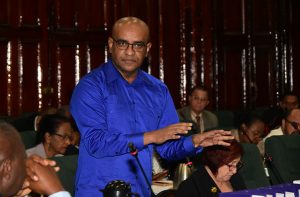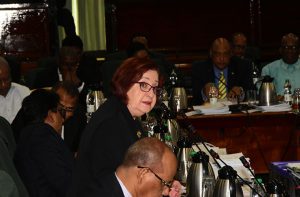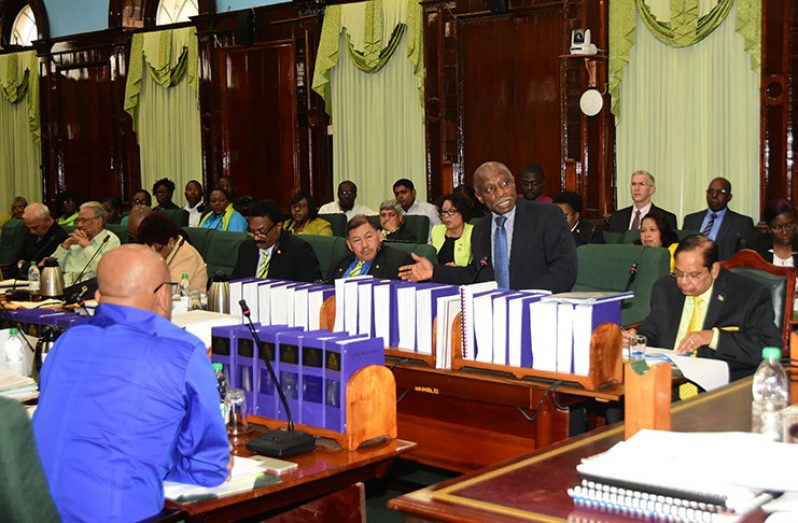…Min Greenidge says ICJ yet to set schedule for case
THE Ministry of Foreign Affairs’ request for $788, 049, 000 to meet estimated legal and related costs associated with lawyers representing Guyana at the International Court of Justice (ICJ) on the Guyana-Venezuela border controversy case was approved by the National Assembly, Friday.
The sum, which forms part of Financial Paper No. 2 of 2018, and totals $2, 526, 563, 240 representing supplementary estimates for current and capital expenditure, was debated Friday. The Ministry of Foreign Affairs had already received some $300,000,000 as part of its voted provisions.
Foreign Affairs Minister, Carl Greenidge in response to questions posed by Opposition Chief Whip Gail Teixeira maintained that his government is following the right procedure to request funds for the said purpose. Some US$15M of the US$18M in signing bonus received from US oil giant ExxonMobil in 2016 will be used to pay for services relative to the Guyana-Venezuela border controversy which has been placed before the Hague-based ICJ.

Government has said that the signing bonus would at some point be transferred to the Consolidated Fund, after which government would have to make applications to the National Assembly for its approval of the identified sums to pay persons for their services.
“Mr Chairman, the request contained in the supplementary reflects the estimated expenditure that the Ministry of Foreign Affairs will incur as a result of obtaining counsel for fighting the case at the ICJ,” said Greenidge in response to Opposition Chief Whip Gail Teixeira’s queries.
Teixeira asked whether the $788M as requested by the Foreign Affairs Ministry is part of the US$15M signing bonus. “The ministry anticipates; and we have to anticipate because lawyers are paid on a time basis essentially, and at this point in time we anticipate that the demands on the lawyers hand should not cost more than the figure shown… It may be more, it may be less. We are not able to anticipate that. The portion or total that is shown here is the expenditure we anticipate in 2018,” said Greenidge, who noted that come 2019 or 2020, there will be estimates of the amounts needed in those years.
Teixeira then questioned why the government has decided against transferring all of the US$18M to the Consolidated Fund. “I am not sure I understand the intent of the question. We have indicated to the Parliament to fund the exercise; the exercise takes place across a number financial years, and so we don’t plan to transfer it all in the year… We will transfer in the year to which the expenditure arises,” responded the Foreign Affairs Minister.
SIGNING BONUS
Finance Minister Winston Jordan had earlier announced that the US$18M signing bonus remains in the Bank of Guyana, but has been invested in U.S. treasury bills and Canadian bonds where it is accumulating interest. Jordan told reporters that while the money has not been used, it has already accumulated US$36,169 in interest. “I have the latest statement from the Bank of Guyana, and it says that the account has a balance of US$18,036,169,” he stated.
“All US$18 million is still in the account, plus the interest, of course. During 2018, since we did not know when the United Nations Secretary-General would make his decision, we did not put any amounts in the budget. So now, what we will have to do is go for supplementary. This supplementary will be based on Ministry of Foreign Affairs’ indication as to how much they think we will have to pay the lawyers and others who provide services related to the ICJ matter,” Jordan had explained.
But Greenidge’s response did not find favour with the Opposition Chief Whip, who reminded the House that in December 2017, some $300,000,000 was approved. At that time, Guyana was not informed that the matter had been forwarded to the ICJ for resolution. “What is the size of the legal team, the salaries and benefits, and could you advise if we have hired consultants both local and foreign? Teixeira asked as Greenidge, who was ably backed by his colleagues on the government side of the House, jumped to his feet. The Foreign Minister said he understands that members of the opposition may not be too familiar with how legal fees are spent, because in the CGX case relative to Suriname, “it never came to the House”. It was this latter statement of Greenidge’s that resulted in Opposition Leader Bharrat Jagdeo and other members voicing much objection. “CGX never paid any money to us…,” said Jagdeo who was backed up by opposition members.
“Mr Chairman, I am trying to explain that as regards lawyers and the work they are going to do on this particular occasion, we are only able to tell you that the monies will cover things associated with the hours spent by the lawyers and any additional expenses they identify. The question of gratuity is not part of any standard arrangement,” Greenidge said in response, following the intervention of the Chairman of the Committee of Supply and House Speaker, Dr Barton Scotland through the constant pounding of his gavel to maintain order in the House.

Notwithstanding the cross-talking by members of the Opposition, Minister Greenidge notified the House that Guyana is being represented by a core team of lawyers. He explained that the team is “not quite complete”, but as things and time progress, lawyers and law firms will be added to the team to address challenges. “I can’t say all the lawyers; I don’t know, a lot of this will depend on what the other side does,” he said noting that the ICJ is yet to set the schedule of how the case will proceed. The Foreign Minister said that funds are needed to pay the retained attorneys soonest.
PREVIOUS FUNDS
The Opposition clearly not satisfied with the response provided asked Greenidge to inform the House of the amount of money used from the budgeted $300M given that the supplementary amount is being sought in May, a mere five months after the $300M was approved by the House. The Minister of Foreign Affairs said the $300M was utilised for previous arrangements which arose from interface with the Secretary-General of the United Nations (UN) along with his Personal Representative. Additionally, part of the money has been used to make payments to other consultants and lawyers associated with works relative to the Border Commission in Suriname. “That is separate from the amounts that are required to meet the expenses of the team. The ICJ issue is being treated separate. We do have other obligations… and other activities associated with the defence of our territory,” the Minister stated.
Meanwhile, Opposition Leader Bharrat Jagdeo questioned whether the Consolidated Fund “would go broke in 2018”, “does the Minister think we would run out of foreign currency and what is the compelling reason for keeping the entire sum of money outside of the Consolidated Fund in breach of the FMAA [Fiscal Management and Accountability Act]?” asked Jagdeo. In response, Greenidge said, “the answer to all the questions is no. As regards the final query regarding the Consolidated Fund, there is a minister here with that responsibility.”
Standing on a point of order, Finance Minister Winston Jordan reminded the House that the matter relative to the Signing Bonus is still engaging the local courts. “We are treading dangerously on a matter that is before the court. Sir I beseech you,” said Jordan. Jagdeo a former President then questioned whether as indicated in Article 33 (1) of the government’s contract with U.S. oil giant ExxonMobil government upon transfer of money to the Consolidated Fund will share with the said company details of the accounts holding the sums.
“I believe the reference to the signing bonus itself is misplaced. We have two elements, one is expenditure and one is revenue. We are asking permission to spend…By the Fiscal Management and Accountability Act we are required to seek the permission of the House to undertake expenditure…it has nothing to do with the source.” Greenidge made it clear that questions relative to a third party must be asked to the appropriate minister.




.png)









